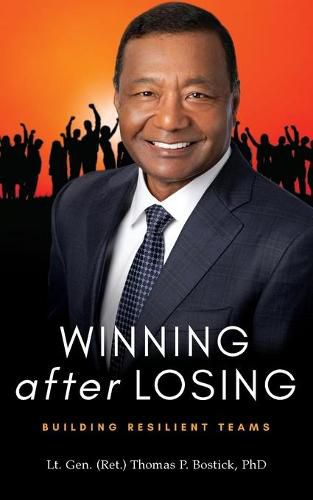Readings Newsletter
Become a Readings Member to make your shopping experience even easier.
Sign in or sign up for free!
You’re not far away from qualifying for FREE standard shipping within Australia
You’ve qualified for FREE standard shipping within Australia
The cart is loading…






This title is printed to order. This book may have been self-published. If so, we cannot guarantee the quality of the content. In the main most books will have gone through the editing process however some may not. We therefore suggest that you be aware of this before ordering this book. If in doubt check either the author or publisher’s details as we are unable to accept any returns unless they are faulty. Please contact us if you have any questions.
Individuals, teams, and organizations must become more resilient in today’s complex world, and each one will experience failure at some point. Successful individuals, teams, and organizations bounce back. Winning After Losing, Building Resilient Teams offers a collection of lessons on leadership and resilience, of winning teams. I am writing this book as a retired U.S. Army three-star General, and as the former Chief Operating Officer of a public biotechnology company. Each leadership role taught me valuable lessons, whether serving with tactical units, at the corporate level in The Pentagon, or in seemingly impossible global missions. After transitioning into the business environment, many of these lessons of leadership and teamwork continued to make a significant positive impact. All businesses experience failure at some point in their growth, and they can bounce back through great leadership and teamwork. Whether in the military, government, or business, it is possible to build winning resilient teams.
Resilience is the capacity to recover. It is the effort expended to bend but not break despite trauma, tragedy, adversity, or crisis. Ultimately resilience is adapting based on lessons learned, to bounce back stronger than before. If you like winning, learn as much as possible from the experience of losing…that is what resilient teams do so well. Lt. Gen. Thomas P. Bostick
$9.00 standard shipping within Australia
FREE standard shipping within Australia for orders over $100.00
Express & International shipping calculated at checkout
This title is printed to order. This book may have been self-published. If so, we cannot guarantee the quality of the content. In the main most books will have gone through the editing process however some may not. We therefore suggest that you be aware of this before ordering this book. If in doubt check either the author or publisher’s details as we are unable to accept any returns unless they are faulty. Please contact us if you have any questions.
Individuals, teams, and organizations must become more resilient in today’s complex world, and each one will experience failure at some point. Successful individuals, teams, and organizations bounce back. Winning After Losing, Building Resilient Teams offers a collection of lessons on leadership and resilience, of winning teams. I am writing this book as a retired U.S. Army three-star General, and as the former Chief Operating Officer of a public biotechnology company. Each leadership role taught me valuable lessons, whether serving with tactical units, at the corporate level in The Pentagon, or in seemingly impossible global missions. After transitioning into the business environment, many of these lessons of leadership and teamwork continued to make a significant positive impact. All businesses experience failure at some point in their growth, and they can bounce back through great leadership and teamwork. Whether in the military, government, or business, it is possible to build winning resilient teams.
Resilience is the capacity to recover. It is the effort expended to bend but not break despite trauma, tragedy, adversity, or crisis. Ultimately resilience is adapting based on lessons learned, to bounce back stronger than before. If you like winning, learn as much as possible from the experience of losing…that is what resilient teams do so well. Lt. Gen. Thomas P. Bostick